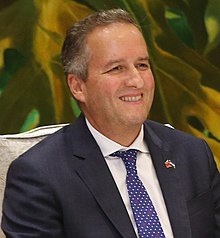
Honduras was inhabited by many indigenous peoples when the Spanish arrived in the 16th century. The western-central part of Honduras was inhabited by the Lencas, the central north coast by the Tol, the area east and west of Trujillo by the Pech, the Maya and Sumo. These autonomous groups traded with each other and with other populations as distant as Panama and Mexico. Honduras has ruins of several cities dating from the Mesoamerican pre-classic period that show the pre-Columbian past of the country.

Politics of Honduras takes place in a framework of a multi-party system presidential representative democratic republic. The President of Honduras is both head of state and head of government. Executive power is exercised by the government. Legislative power is vested in the National Congress of Honduras. The party system is dominated by the conservative National Party of Honduras, the Liberal Party of Honduras, and Liberty and Refoundation.

Fernando de la Rúa was an Argentine politician and a member of the Radical Civic Union (UCR) political party who served as President of Argentina from 10 December 1999 to 21 December 2001. De la Rúa was born in Córdoba; he entered politics after graduating with a degree in law. He was elected senator in 1973 and unsuccessfully ran for the office of Vice President as Ricardo Balbín's running mate the same year. He was re-elected senator in 1983 and 1993, and as deputy in 1991. He unsuccessfully opposed the pact of Olivos between President Carlos Menem and party leader Raúl Alfonsín, which enabled the 1994 amendment of the Argentine Constitution and the re-election of Menem in 1995.

Porfirio Lobo Sosa also known by his nickname, Pepe Lobo, is a former Honduran politician businessman and agricultural landowner who served as 37th President of Honduras from January 27, 2010 to January 27, 2014. A member of the conservative National Party and a former deputy in the National Congress of Honduras from January 25, 1990, he was president of the National Congress of Honduras from January 25, 2002 to January 25, 2006. He came second to Manuel Zelaya with 46% of the vote in the 2005 general election. After the military ousted Zelaya in a coup d'état, Lobo was elected president in the 2009 presidential election and took office on January 27, 2010.
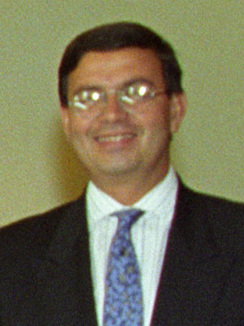
Rafael Leonardo Callejas Romero was the 31st President of Honduras from January 27, 1990 to January 27, 1994, representing the National Party of Honduras (PNH).

The National Congress is the legislative branch of the government of Honduras.
Alba Nora Gúnera Osorio was a Honduran politician and wife of General Juan Alberto Melgar, the Honduran military Head of State from 1975 to 1978. After being elected mayor of Tegucigalpa, she ran for presidency for the National Party in 1997 elections, but lost to Liberal Party nominee Carlos Roberto Flores. She served as the 6th Vice-President of the National Congress of Honduras during the 2010-2014 legislature.

Iris Xiomara Castro Sarmiento, also known as Xiomara Castro de Zelaya, is a Honduran politician who has served as the 56th president of Honduras since January 2022. She is the country's first female president, and served as first lady during the presidency of her husband Manuel Zelaya.

Elvin Ernesto Santos Ordóñez is a Honduran politician who served as the vice president of Honduras from January 2006 to November 2008, when he resigned to stand as a Liberal Party candidate for the presidency in the 2009 elections. For the 2005 election the constitution was amended to create a single vice president. Although Santos served as vice president under the presidency of Manuel Zelaya, he distanced himself from Zelaya since there were conflicts between the two politicians. He was also against the fourth ballot box referendum that Zelaya promoted.
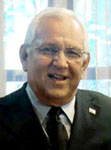
Roberto Micheletti Baín is a Honduran politician who served as the interim and 36th president of Honduras from June 28, 2009 to January 27, 2010 as a result of the 2009 Honduran coup d'état. The Honduran military ousted the President, and the National Congress read a letter of resignation, which was refuted two minutes later by Manuel Zelaya in conversation with CNN en Español; days later, the coup-plotters claimed that the Supreme Court had ordered to forcefully detain President Manuel Zelaya because "he was violating the Honduran constitution"; Zelaya was exiled rather than arrested. Micheletti, constitutionally next in line for the presidency, was sworn in as president by the National Congress a few hours after Zelaya was sent into exile by the Honduran military. He was not acknowledged as de jure president by any government or international organization. The 2009 general election took place as planned in November and elected Porfirio Lobo Sosa to succeed Micheletti.
The modern history of Honduras is replete with large-scale disappearances of left-leaning union members, students and others. The legislature approved a new constitution in 1982, and the Liberal Party government of President Roberto Suazo Córdova took office. Suazo relied on United States support — including controversial social and economic development projects sponsored by the United States Agency for International Development — during a severe economic recession. According to the US State Department, "Honduras became host to the largest Peace Corps mission in the world, and non-governmental and international voluntary agencies proliferated."

The 2009 Honduran coup d'état, which took place during the 2009 Honduran constitutional crisis, occurred when President Manuel Zelaya failed to follow the Honduran Supreme Court ruling. On 28 June 2009, the Honduran Army ousted him and sent him into exile. Zelaya had attempted to schedule a non-binding poll to hold a referendum on convening a constituent assembly for writing a new constitution. Despite court orders to cease, Zelaya refused to comply, and the Honduran Supreme Court issued a secret arrest warrant dated 26 June. Two days later, Honduran soldiers stormed the president's house in the middle of the night, detained him, and thwarted the poll. Instead of putting him on trial, the army put him on a military plane and flew him to Costa Rica. Later that day, after reading a resignation letter of disputed authenticity, the Honduran Congress voted to remove Zelaya from office and appointed Head of Congress Roberto Micheletti, his constitutional successor, to complete his term. This was the first coup to occur in the country since 1978.
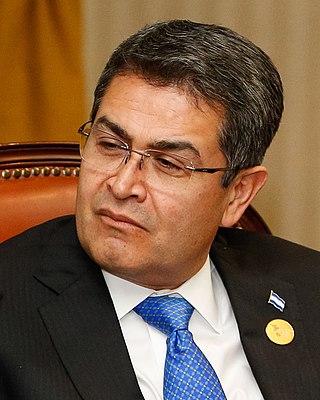
Juan Orlando Hernández Alvarado, also known by his initials JOH, is a Honduran lawyer, politician and convicted drug trafficker who was 38th president of Honduras from January 27, 2014 to January 27, 2022 for two consecutive terms.
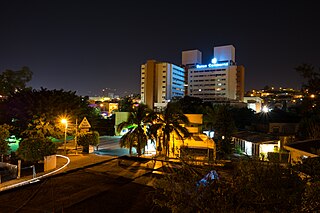
Tegucigalpa —formally Tegucigalpa, Municipality of the Central District, and colloquially referred to as Tegus or Teguz—is the capital and largest city of Honduras along with its sister city, Comayagüela.
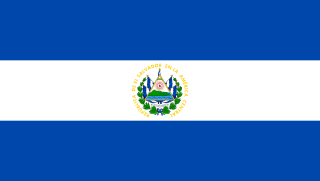
The Salvadoran military dictatorship was the period of time in Salvadoran history where the Salvadoran Armed Forces governed the country for almost 48 years from 2 December 1931 until 15 October 1979. The authoritarian military dictatorship limited political rights throughout the country and maintained its governance through rigged elections.
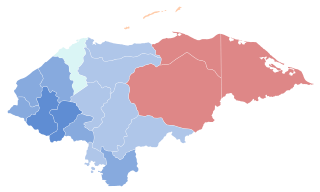
General elections were held in Honduras on 24 November 2013. Voters went to the polls to elect a new President, the 128 members of the National Congress, 298 Mayors and vice-mayors and their respective councilors and 20 representatives to the Central American Parliament.

Salvador Alejandro César Nasralla Salum is a Honduran industrial civil engineer, sports journalist, television presenter, businessman, and politician who served as the First Vice President of Honduras from 2022 until his resignation in 2024.

General elections were held in Honduras on 26 November 2017. Voters went to the polls to elect the President of Honduras to serve a four-year term, as well as 128 members of the unicameral National Congress, 20 members for the Central American Parliament and mayors for the municipalities of Honduras.
Delia Beatriz Valle Marichal is a Honduran dentist, diplomat, politician, and television presenter. She has served as the ambassador of Honduras to Canada, vice chancellor of Foreign Affairs, and deputy in the National Congress for the Liberty and Refoundation party.
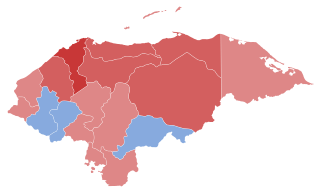
General elections were held in Honduras on 28 November 2021. Among the positions being contested was the President of Honduras, head of state and head of government of Honduras, to replace Juan Orlando Hernández from the National Party. Also up for election were the 128 deputies of the National Congress, 20 deputies to the Central American Parliament, 298 mayors and 298 vice mayors, as well as 2,092 council members.
